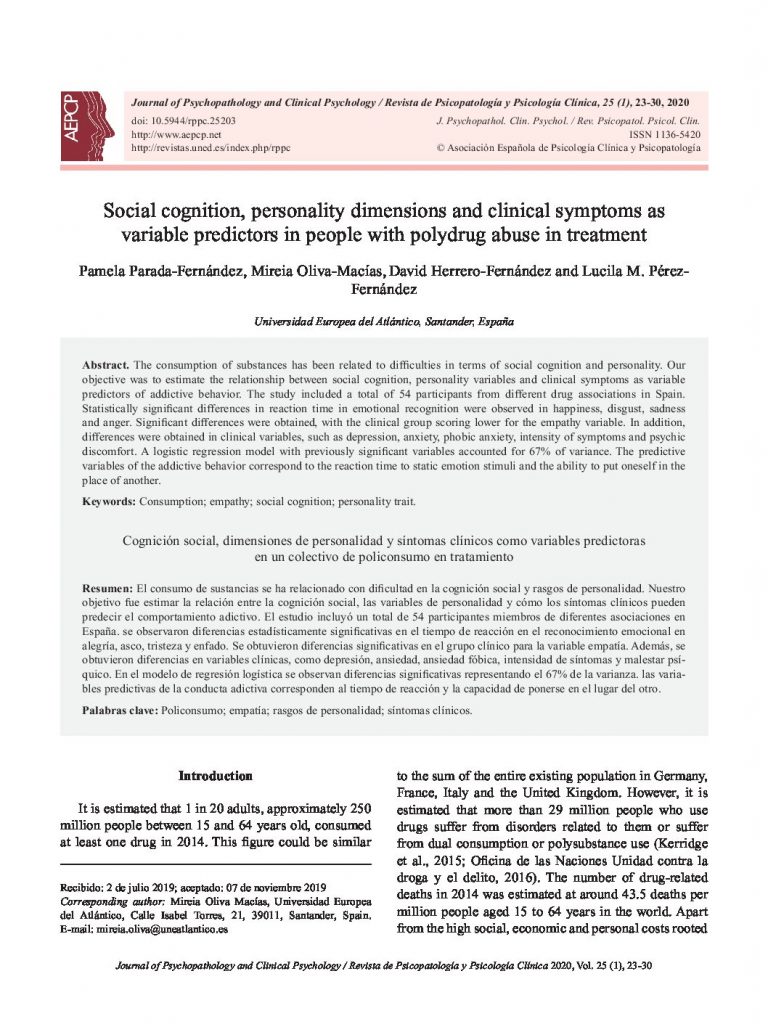Social cognition, personality dimensions and clinical symptoms as variable predictors in people with polydrug abuse in treatment.
Social cognition, personality dimensions and clinical symptoms as variable predictors in people with polydrug abuse in treatment.

- Impacto psicológico de la pandemia de COVID-19: Efectos negativos y positivos en población española asociados al periodo de confinamiento nacional.
- Social cognition, personality dimensions and clinical symptoms as variable predictors in people with polydrug abuse in treatment.
- Internet use patterns and the relation between generalized problematic internet use and psychological distress in Portuguese university students.
- Online sexual activities in Hispanic women: A chance for non-heterosexual women?.
- Biopsychosocial effects of training in recognition, emotional facial reproduction and relaxation: A pilot study.
- Propiedades psicométricas de los cuestionarios Reactive/Proactive Questionnaire (RPQ) y How I Think Questionaire (HIT) en estudiantes peruanos.
- Traumatic events and psychopathological symptoms in university students.
- Psychological impact of the COVID-19 pandemic: Negative and positive effects in Spanish population during the mandatory national quarantine
The consumption of substances has been related to difficulties in terms of social cognition and personality. Our objective was to estimate the relationship between social cognition, personality variables and clinical symptoms as variable predictors of addictive behavior. The study included a total of 54 participants from different drug associations in Spain. Statistically significant differences in reaction time in emotional recognition were observed in happiness, disgust, sadness and anger. Significant differences were obtained, with the clinical group scoring lower for the empathy variable. In addition, differences were obtained in clinical variables, such as depression, anxiety, phobic anxiety, intensity of symptoms and psychic discomfort. A logistic regression model with previously significant variables accounted for 67% of variance. The predictive variables of the addictive behavior correspond to the reaction time to static emotion stimuli and the ability to put oneself in the place of another.
El consumo de sustancias se ha relacionado con dificultad en la cognición social y rasgos de personalidad. Nuestro objetivo fue estimar la relación entre la cognición social, las variables de personalidad y cómo los síntomas clínicos pueden predecir el comportamiento adictivo. El estudio incluyó un total de 54 participantes miembros de diferentes asociaciones en España. se observaron diferencias estadísticamente significativas en el tiempo de reacción en el reconocimiento emocional en alegría, asco, tristeza y enfado. Se obtuvieron diferencias significativas en el grupo clínico para la variable empatía. Además, se obtuvieron diferencias en variables clínicas, como depresión, ansiedad, ansiedad fóbica, intensidad de síntomas y malestar psí- quico. En el modelo de regresión logística se observan diferencias significativas representando el 67% de la varianza. las varia- bles predictivas de la conducta adictiva corresponden al tiempo de reacción y la capacidad de ponerse en el lugar del otro.



